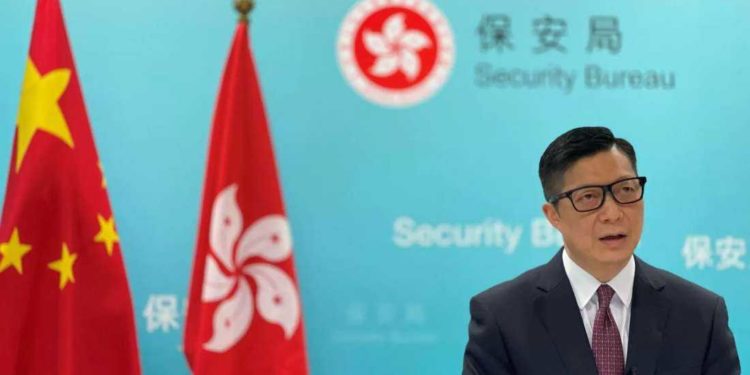Ming Pao newspaper cartoon mocked a proposed advanced communication system for security forces
Hong Kong’s Secretary for Security Chris Tang. (Photo: Hong Kong government via HKFP)
Hong Kong’s security chief Chris Tang has expressed dismay over a newspaper comic strip that allegedly mocked a proposed advanced communication system for the police force and termed it “misleading.”
The secretary for security in the Chinese-ruled city alleged during a press conference on April 2 that the comic published by Ming Pao newspaper was inflammatory that can trigger the citizen’s discontent against the government, Hong Kong Free Press (HKFP) reported on April 3.
“If you’re not criticizing, not basing things on facts, but are using some misleading accusations to provoke citizens’ discontent towards the government, I think I have the duty to tell the truth,” said Tang.
He further added that he must “condemn these misleading accusations publicly to give citizens the right to know.”
The comic strip in Ming Pao created by cartoonist Zunzi, the pen name of Wong Kee-Kwan, took a dig at the proposed HK$5.2 billion Next Generation Communication System (NGCS) for the police force.
It depicted a man and woman discussing the proposal. The man said that “reserving HK$20 billion is not a lot for upgrading the equipment for disciplined forces,” HKFP reported.
When the woman pointed out that the amount is HK$5.2 billion and not HK$20 billion the man in the comic strip suggests that “with better equipment, there will be more arrests – and we need to build two more prisons and hire more prison guards.”
The comic strip then further depicts the man saying that “with more cases handled by the courts, more judges have to be hired, and we have to import foreign workers, provide accommodation, and education subsidies for their children.”
Tang was particularly enraged because the cartoon strip suggested that enhanced technology would be used to “monitor and target” citizens.
“I have said clearly, technology is for helping us to handle emergencies,” Tang said.
Zunzi has “targeted the government more than once and made misleading accusations over the past six months,” Tang said.
Hong Kong’s Catholic Chief Executive John Lee had earlier criticized Zunzi over a comic strip about the government’s talent attraction scheme.
Tang further added that the Hong Kong government was “very happy” to accept criticism, and that “criticizing was not a problem.”
According to documents submitted to the Legislative Council by the police force, the new communication system is intended to address threats to national security and mitigate geopolitical tensions.
“The [police force] proposes to build the NGCS to improve the operational efficiency of policing and emergency services, address national security needs, and reduce the potential risks associated with geopolitical tensions by establishing a reliable, highly stable, sustainable, and more secure communications network,” the document read.
After Beijing imposed the National Security Law in Hong Kong in 2020, state-sponsored censorship and suppression of any expression of dissent in the territory intensified.
In September 2022, Five Hong Kong unionists were found guilty of sedition for producing a series of illustrated children’s books that portrayed the city’s democracy supporters as sheep defending their village from wolves.
Rights groups have accused the Hong Kong government of exploiting the British colonial-era sedition law and the national security law to suppress any voice of dissent expressed by individuals through words, actions, or imagery.
In August 2022, Chickeeduck, a popular clothing brand in Hong Kong, announced the closure of all its stores allegedly over harassment from the government due to its support for the pro-democracy protests.
Latest News
Credit: Source link




